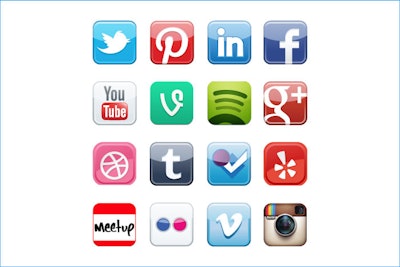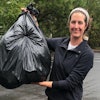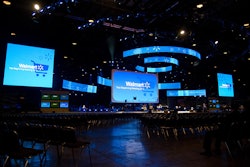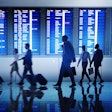
Social media is now one of the most important tools planners and marketers can use to disseminate information about events, interact with attendees, solicit feedback, and create year-round engagement with a target audience. But its rise to prominence has prompted questions about how to effectively employ Facebook, Twitter, Instagram, and other such sites before, during, and after live gatherings. During Social Media Week in New York, two panels focused exclusively on that topic, with the TBA Global-hosted panel, "Doing it live: The integration of social in live events," and the discussion "How social media drives New York's biggest events" organized by Flatiron Communications with BizBash.
Here are some key takeaways from both conversations to help identify when your event's social media strategy isn't working.
1. You're on the wrong platform
There isn't one social media platform that's perfect for every event or brand, but if you're looking to engage a specific audience, do your homework by finding out which they're most actively using. Tapping into an existing community can amplify your efforts. That doesn't mean you should limit yourself to a single site, but keep in mind whom you're looking to engage as well as the type of content you're sharing.
"You realize some platforms are going to work better than others for different messages, and really we just try to remember that above all it's a communication tool," said Amy Hintz, who, as marketing director at CMJ, oversees the five-day CMJ Music Marathon. "It can make the whole process a lot simpler if you think, A, who are we talking to, and B, what do they want to know from us." Hintz said she uses Spotify to share playlists before the music festival, Twitter during the event, and Pinterest to capture the street style of attendees.
2. You're on too many platforms
Avoid spreading your event's message—and your team's efforts—too thin. It can be easy to overwhelm guests with too much information in too many places and lose engagement. "I think [social media's] here to stay and we're embracing it, but know when to edit. I think on every platform, you just need to know when it's too much," said Jarrad Clark, global director of production for Fashion Week organizer IMG Fashion.
Likewise, if you find a social media site isn't working for you, move on. "You don't have to be everywhere. You don't have to be on Instagram, you don't have to be on Vine, you don't have to be everywhere out there," said Shawn Busteed, senior vice president of business strategy at TBA Global. "Be in the places you actually have something worth saying. Don't just throw stuff out into the ether and hope it turns out that someone likes it."
3. You didn't provide guests with the right tools and information
Make sure attendees know the platforms you're using—whether they are integrated into the event registration site, listed on the invitation, or displayed at the event—as well as the designated handle or hashtag.
If you create a hashtag for an event, make it short and make it visible. (Here are four tips for choosing the best hashtag and 15 ways to promote it.) According to Ben Hindman, co-founder and C.E.O. of SplashThat (a company that offers online planning and management tools for events), events that list their hashtag see "up to 50 percent more social reach."
4. You didn't empower hosts, speakers, and sponsors
Equally as important as communicating with guests is reaching out to partners, whether it's the speakers at your conference, the host of your award show, or the sponsors of your festival. Matt Spangler, who, as the executive vice president of content and marketing at Tribeca Enterprises, oversees the branding and creative production for the Tribeca Film Festival, described the innovative social media promotions brands like Conrad Hotels and American Express have built, which expand the event's reach as well as that of the sponsors. "Great partners help—it is called social after all—and we have some great partners who also believe in the power of social media around the festival and what we can do to activate people," he said.
Others, including Hintz and Clark, cite the importance of engaging key participants, including the artists who perform in the Music Marathon and the designers that show during Fashion Week, who can help build the community before the event. The Tribeca Film Festival even creates a social media tool kit for filmmakers as a way to introduce the different channels available to them. "We see a lot of response from our indie filmmakers—they're thirsty for any information that we can give them," Spangler said. "Most of them are really savvy already and don't need our help, and oftentimes they're giving us tips and things that we can share. It's a great back and forth, but they do appreciate the help."
5. There was no one on-site to help lead the conversation
An increasing number of brands and organizations assign a staffer or team to manage and monitor social conversations during an event. Those representatives can not only help drive discussions, but also answer questions and respond to complaints. Some larger events hire freelancers or tap individuals with significant social followings to help capture what's happening. "We're finding that three or four people equal about 90 percent of the social reach at any given event," Hindman said. "Your job as an event planner, or as someone having anything to do with that event, is to immediately recruit those people."
6. You didn't provide incentives for guests to interact
The panelists of "Doing it live" agreed that any social media strategy should feel organic and natural, not forced. Eye-catching decor, great speakers, unique competitions, and unusual entertainment can provide attendees with fodder to photograph, comment on, and share. The more enthusiastic your event guests are, the more likely they will be to want to post something with their online networks.
Additionally, attendees want to feel appreciated for their contribution. "When I go to events, I want to see more rewards for participating in the sense of stroking egos... It's the sense that my voice counted," said Bridget Carey, senior editor at CNET and host of daily tech news show, CNET Update.
"I do think as event planners, your goal is to make it easy for people to use social tools and then make them feel really good about it. Getting retweeted seems like it wouldn't be a big deal, but I guarantee people will be excited," Busteed said.
7. The conversation ends when the event does
Part of any event's social media program should include keeping an audience engaged once the event finishes, whether that's posting a recap, sharing photos and videos, thanking participants, or responding to feedback. (Here are ways to keep the conversation going.)
"We use the feedback we get on social media to shape the event. It's one of the best ways to be tuned in and quickly adapt to what our attendees want, but still give them the experience they come to expect from us," Hintz said. "If we get just one piece of feedback that makes us a more effective event, we find that to be worthwhile."
Even with all of this in mind, there is no one right way to combine social media and event marketing. "Really, each [social media promotion] is an experiment and some of them work, some of them don't," said Tim Tompkins, president of the Times Square Alliance, which organizes events such as Times Square New Year's Eve. "Like everybody else, it's a constantly changing world and we're learning."



















